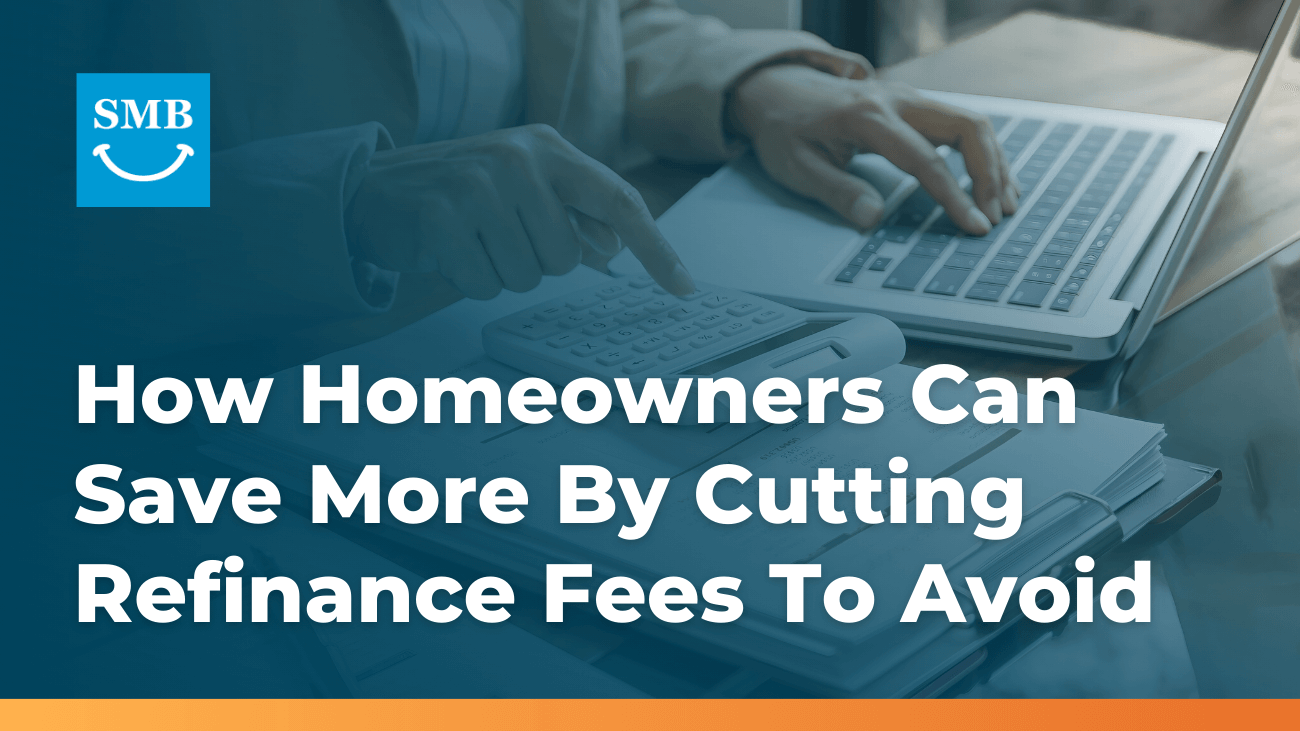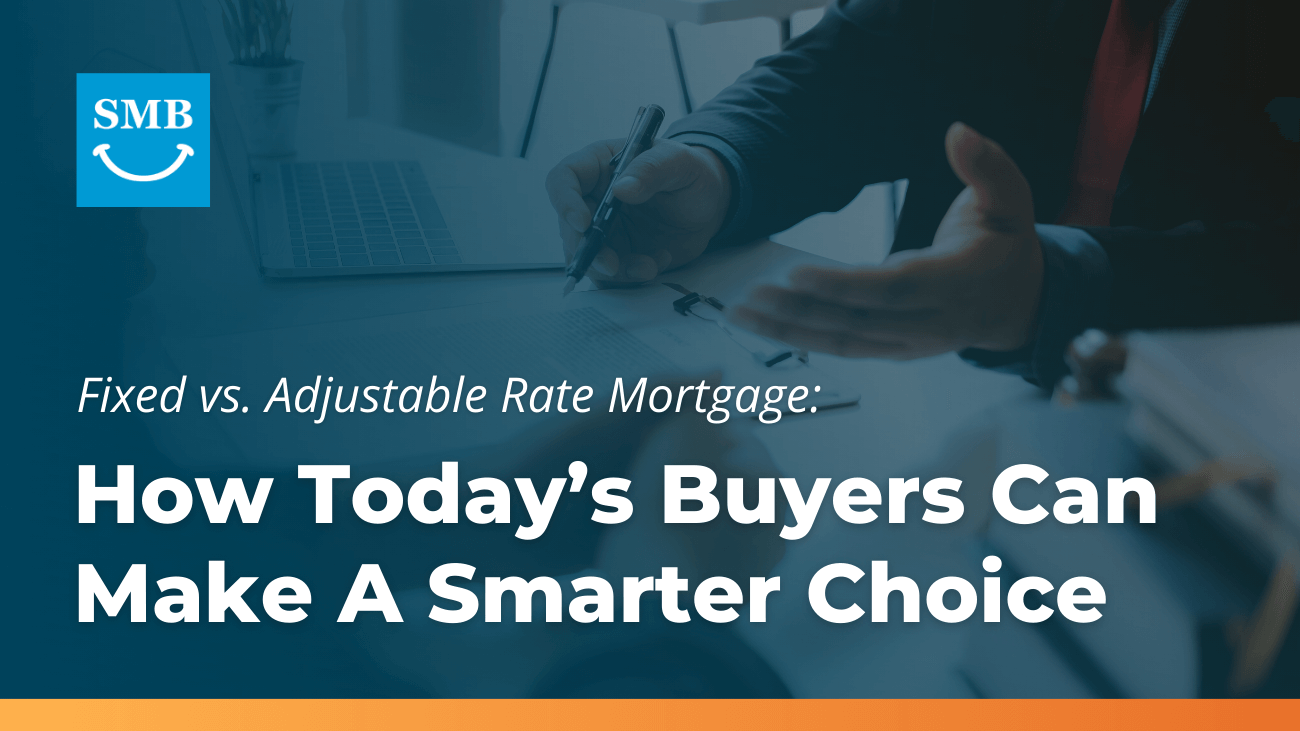7 Mistakes to Avoid When Refinancing Your Home

This article was originally published on September 8, 2019 and updated on November 16, 2024.
Refinancing can offer homeowners great benefits—but it has to be done the right way.
Like any major financial decision, it requires careful planning. When rushed or mismanaged, refinancing can lead to costly consequences, creating unnecessary stress and potentially impacting a mortgage loan over the long term.
When it comes to mortgages, knowledge is power.
That's why we've put together a list of seven mistakes to avoid when refinancing. Don’t make these common missteps and you’ll get all of the benefits of refinancing, without any of the extra stress.
Read on to set yourself up to refinance your mortgage the right way.
What is a Mortgage Refinance?
Before we start with all of the tips, let's outline exactly what it means to refinance a mortgage.
Refinancing your existing mortgage is simply getting a new mortgage that replaces your previous one.
Customizing Your Mortgage
When you got your first mortgage, your financial needs may have been quite different from what they are today. This often leads homeowners to refinance, as it allows you to customize the terms of your new mortgage based on your present reality.
The benefits homeowners are often seeking when they remortgage are to pay the home off faster, get a better interest rate, or get lower monthly mortgage payment.
Is Refinancing Bad? 7 Mistakes to Avoid
To get these benefits, there are a number of pitfalls homeowners should avoid. These errors—often due to a lack of understanding—can cause homeowners to incur high costs, damage credit, or even create financial instability.
Remember, there are always risks when it comes to big financial moves, but these risks become significantly less likely when the following two considerations are properly assessed:
- Is the timing right?
- Does it make financial sense for my situation?
To ensure you don’t miss any critical details, use the following list of common mistakes as a guide. This checklist will help you make a more-informed decision and avoid falling behind financially.
1. Don’t Forget About Closing Costs
One of the biggest oversights homeowners make when refinancing is underestimating—or entirely forgetting about—the refinancing costs involved in securing a new loan.
Just like when you first purchased your home, refinancing comes with a variety of fees associated with the new loan. These can include appraisal fees, loan origination fees, title insurance, and more, often totaling between 2% and 5% of the loan amount.
While these costs might seem small in the grand scheme of things, they can quickly add up and impact your break-even point—the time it takes for the savings from refinancing to cover the costs.
If you’re refinancing to lower your monthly payment, be sure to factor in these refinancing costs and calculate whether the long-term savings actually outweigh the upfront expenses of the new loan.
2. Reconsider Using Home Equity for Discretionary Spending
While cash-out refinancing can be a tempting way to access a large sum of money, using your home’s equity to fund major purchases is often not the right call.
A cash-out refinance allows you to take out a new loan that’s larger than your current mortgage balance, giving you the difference in cash. Many homeowners use this option to pay for expenses like home renovations, debt consolidation, or even big-ticket purchases.
However, tapping into your home equity for discretionary spending can backfire.
By increasing your loan balance, you’re also increasing your monthly payments and the amount of interest you’ll pay over time. Additionally, if property values decline, you could end up owing more than your home is worth, putting you “underwater” on your mortgage.
Before using a cash-out refinance for large purchases, ask yourself if it’s truly worth the long-term cost. Remember, your home is one of your most valuable assets; dipping into its equity should be done carefully and with a clear strategy in mind.
Refinancing should ideally be reserved for financial moves that strengthen your position—not ones that could jeopardize it.
3. Ensure You Have a Long-Term Plan In Mind
Lowering your monthly mortgage payments can seem like a quick win, but doing so without a well-thought-out, long-term plan can lead to unintended financial consequences.
Many homeowners refinance to reduce their monthly payments, only to discover that this short-term relief comes with significant long-term costs.
Reducing your payment often means extending the loan term or taking on additional fees, which increases the total interest paid over the life of the loan.
As we already mentioned, refinancing also comes with upfront costs such as closing rates, application fees, and title fees, which can add up quickly. Be sure to incorporate these refinance costs into your calculations.
If your primary motivation is to free up monthly cash flow, consider how this aligns with your broader financial goals. Will this move support your path to financial security, or will it ultimately slow down your progress toward becoming debt-free? Refinancing should work in harmony with your future plans, not just provide immediate relief.
Without a solid strategy, you may find yourself paying far more over the life of your mortgage than if you had stayed with your original loan.
4. Think Twice About Refinancing Before Having 20% Equity in the Home
Refinancing without at least 20% equity in your home can limit your options and may lead to higher costs.
Lenders typically require at least 20% equity to avoid private mortgage insurance (PMI), an additional monthly expense that protects the lender in case of default. If you refinance with less than 20% equity, you’ll likely need to pay PMI, which can significantly reduce or even cancel out the financial benefits of refinancing.
Additionally, limited equity may restrict your ability to access favorable terms, such as lower interest rates or flexible loan options. With less equity, you may be considered a higher risk, and lenders may charge higher rates or fees to offset that risk. This can make refinancing more expensive in both the short and long term.
If your goal is to lower monthly payments or access cash from your home’s equity, waiting until you’ve built up at least 20% equity can help you avoid PMI and potentially secure better terms. Alternatively, if you’re close to reaching the 20% mark, consider focusing on paying down your mortgage balance a bit more before refinancing to ensure you’re in the best position possible.
5. Avoid Making a Major Purchase Before Your Loan is Finalized
Making a significant purchase right before your refinance closes can put the entire process at risk.
When you apply for refinancing, lenders carefully review your credit profile and financial stability to determine your eligibility. A large expense, such as buying a car or new furniture, can impact your credit score, raise your debt-to-income ratio, and ultimately change how lenders view your financial health.
Many lenders conduct a final credit check just before closing to ensure your financial situation hasn't changed since you applied. If they see a new debt or a reduced credit score, it could result in higher interest rates, added conditions, or even a denial of your refinance.
To avoid these issues, it’s best to delay any big purchases until after your refinance has officially closed.
Once the loan is finalized, you’ll have more flexibility to make financial decisions without risking the terms of your refinance.
6. Consider Switching to a Fixed-Rate Mortgage
When refinancing, many homeowners automatically stick with their current mortgage type, whether it's an adjustable-rate mortgage (ARM) or a fixed-rate loan, without exploring how switching might benefit them.
If you currently have an ARM, you may have enjoyed a low introductory rate, but with fluctuating interest rates, your payments could rise significantly over time. Refinancing into a fixed-rate mortgage can lock in a consistent interest rate and stabilize your monthly payments, giving you greater predictability in your finances.
On the other hand, if you’re currently in a fixed-rate mortgage but anticipate moving in a few years, an adjustable-rate mortgage might be worth considering. ARMs often offer a lower initial rate, which could lead to savings if you don’t plan to keep the loan for the full term. However, this option is best suited to those who can handle the potential risk of rate increases.
Evaluating both options is essential. Switching to a fixed-rate mortgage provides long-term peace of mind with stable payments, while an ARM might offer short-term savings for those with specific plans. By carefully considering your goals, financial stability, and future plans, you can choose a refinancing option that aligns with your needs.
7. Know Your Negotiating Power
One common mistake when refinancing is assuming that interest rates and fees are set in stone.
In reality, many aspects of a refinance offer—such as the interest rate, closing costs, and various fees—can be negotiable. By exploring your options and negotiating with lenders, you may be able to secure more favorable terms and reduce the overall cost of your refinance.
Lenders are often willing to negotiate, especially if you have a strong credit profile or can show competitive offers from other institutions. Requesting a lower interest rate, asking about discounts on fees, or negotiating lower closing costs can make a meaningful difference in your long-term savings.
Additionally, don’t hesitate to shop around and compare offers from different lenders. Even a small reduction in your interest rate or closing costs can add up to substantial savings over the life of the loan.
Remember, refinancing is a major financial commitment, and a little negotiation can go a long way in making sure you get the best possible deal.
Refinancing Reminder
Refinancing a mortgage can help you lower monthly payments, access cash, or stabilize your finances—but it comes with potential costs.
Common mistakes—like overlooking closing fees, refinancing without sufficient equity, or failing to negotiate rates and fees—can offset the financial benefits you’re seeking.
Additionally, using home equity for large purchases, extending your loan term without a plan, or making major purchases before closing can jeopardize your long-term financial stability.
To make the most of refinancing, it’s essential to carefully evaluate your options, consider the total costs involved, and align your decision with your financial goals.
By avoiding these common missteps, you can position yourself for a refinance that truly supports your financial health and future security.
When to Refinance: Mortgage Tips for Long Term Success
Refinancing is often most effective if you plan to stay in your home long enough to recoup the refinancing costs, typically within a few years.
One tip to maximize savings is to only consider refinancing when primary mortgage rates drop at least 1-2% below your current rate as this can create real savings over the life of the loan.
Evaluate your current financial goals, such as lowering monthly payments, switching to a fixed-rate mortgage for stability, or accessing home equity strategically. By refinancing at the right time and with clear objectives, you can build a more secure financial foundation and support your long-term success.
Get Expert Support for Refinancing Success
No matter how prepared you are, there is no one better to guide you through the refinancing process than a mortgage broker who has your best interest in mind.
At Seattle's Mortgage Broker, we are committed to helping you refinance your home to secure a stronger financial future.
Our expert team is ready to help you navigate every step, from finding the best primary mortgage rates to tailoring options that meet your unique needs. We work tirelessly to negotiate favorable terms, minimize fees, and ensure that refinancing brings you the most value possible.
With our in-depth market knowledge, personalized guidance, and dedication to your financial success, you can feel confident knowing that your refinancing journey is in the right hands.
Let’s work together to create a refinancing plan that aligns with your goals, saves you money, and sets you up for long-term stability. Reach out to us and get started today.


The Ultimate Guide to the Best Suburbs of Seattle

Should You Use a Mortgage Broker? Everything You Need to Know First

How to Find the Right Neighborhoods in Seattle for Your Budget and Lifestyle

Warrantable vs. Non-Warrantable Condos: What Every Buyer Needs to Know Before Financing

How Much Does It Cost to Refinance a Mortgage in Seattle? A Homeowner’s Guide
.png)
How Often Can You Refinance Your Home?
.png)
The Complete Guide to For Sale By Owner (FSBO) in Seattle

10 Questions Every Seattle First-Time Home Buyer Asks

Ultimate Seattle Mortgage Loan Documents Checklist

Your Complete Guide to Seattle Property Tax

Why You Should Work with a Mortgage Broker

Where to Find the Best Local Mortgage Broker

Where Are The Best Places To Live In Seattle?

What’s the Best Way to Save Money for a House in Seattle?

When is the Best Time to Refinance a Home?

What is the Jumbo Loan Limit in Seattle 2020?

What You Need to Buy a House in Seattle

What Is a Jumbo Loan and will you need one when moving to Seattle?

What is the Jumbo Loan Limit in Seattle?

What Is A Non-Warrantable Condo?

What is the Best Down Payment Amount on a House in Seattle?

What is PMI Mortgage Insurance? And Why It Is Not As Bad As You Think

What Is A Cash-Out Refinance?

What do Home Loan Underwriters Look For?

What Down Payment Do I Need for a House?

What Are The Costs of Buying a Home?

What Are The Best Neighborhoods In Seattle For Families?

FAQ: What Are the VA Home Loan Requirements?

WEST SEATTLE JUNCTION ; Seattle Neighborhood Tour

What are RSUs and How to Spend Them

Understanding Mortgage Down Payments

Top 5 Seattle Suburbs to Buy In 2021

Understanding Down Payments in Seattle

The Ultimate Mortgage Document Checklist

Top 10 Questions To Ask A Mortgage Broker (Before You Commit)

The Worst First-Time Homebuyer Mistakes

The Top 5 Seattle Suburbs for 2020

The Best Seattle Neighborhoods in 2020

How to Find the Best Mortgage Refinance Companies in Seattle

The Best Seattle Neighborhoods for Families

The Best Neighborhoods in Seattle to Buy a Home

The 7 Best Seattle Suburbs for Families

Seattle Neighborhood Guide: The Top 10 Most Affordable Places To Live In Seattle

SOUTH LAKE UNION ; Seattle Neighborhood Tour

Seattle Summer Housing Market Guide 2020

Seattle Housing Market Update 2020

Seattle Housing Market Hacks

Save Money When Buying a House in Seattle

Save Money on Your Mortgage Refinance

Moving to Seattle with a Family? Here's the BEST Suburbs For You!

Refinancing To Reduce Your Bills and Increase Available Cash

Neighborhoods in Seattle to Buy a Home 2020

Real Estate Trends in Seattle

Mortgage Down Payments in Seattle

MAGNOLIA ; Seattle Neighborhood Tour

Mistakes to Avoid with Cash-Out Refinance

How to Refinance Your Home in 9 Steps

Jumbo Loan Limit vs Conforming Loan Limit in Seattle for 2021

KIRKLAND ; Seattle Neighborhood Tour

Jumbo Loan Limit in Seattle for 2021

ISSAQUAH ; Seattle Neighborhood Tour

Is My Credit Score Good Enough to Buy a House?

How to Buy a House; Home Buying 101

How to Lower Your Monthly Mortgage Payment

How to Get the Best Rate for Your Home Loan

How to Buy a House for Less

How Much Home Can I Buy in Seattle?

How Much Do You Really Need for a Down Payment in Seattle?

How Much Home Can I Afford?

Home Price Forecast for Seattle 2020

How Hot is the Seattle Real Estate Market?

How Hot is the Seattle Real Estate Market in 2022?

Home Inspection Questions You Need to Ask

Do You Need a Realtor to Buy a House in Seattle?

FHA vs. Conventional Loan: Which Mortgage Is Right for You?

Find the Best Mortgage Lender for Your Home Loan

Federal Housing Administration Loans 2021

Down Payment Requirements in Seattle

FACTORIA and SOMERSET ; Bellevue Neighborhood Tour

Everything you Need to Know About Seattle Jumbo Mortgages

Everything You Need to Know About VA Loans

Advice To A First Time Home Buyer: Down Payment Assistance Programs Exist for Millennials

CROSSROADS ; Bellevue Neighborhood Tour

Down Payment 101: How Much Money Do I Need to Buy a House?

COVID-19 Mortgage Help for Homeowners

Comparing ARM vs. Fixed Rate Mortgage

Can I Afford To Buy A Home In Seattle?

Choosing the Best Lenders for Home Loans

How to Use Restricted Stock Units to Buy a Home in Seattle

ARM v. Fixed Mortgage: Which is Right For You?

Ballard or Queen Anne? The Best Neighborhoods of Seattle to Buy a House

Avoiding the Worst Seattle Mortgage Lenders

Are You Buying a House in Seattle? Here’s the Ultimate Survival Guide

Fixed vs. Adjustable Rate Mortgage: How Today’s Buyers Can Make A Smarter Choice

ALKI BEACH ;; A Seattle Neighborhood Tour

A Complete Guide to Refinancing Your Home Loan

8 Ways to Lower Your Mortgage Payment

8 Mistakes to AVOID When Mortgage Loan Refinancing


















